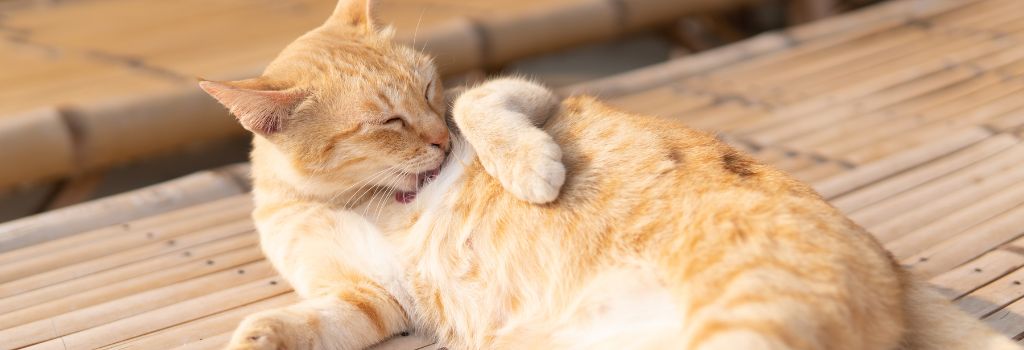In the hustle and bustle of pet parenthood, it’s easy to focus on the basics: food, shelter, and physical health. However, one crucial aspect of pet care often goes overlooked — mental health and enrichment.
Like humans, our furry companions have complex emotional needs requiring attention and care. As veterinarians, we’ve witnessed how proper enrichment can transform a pet’s life.
The Importance of Pet Mental Health
Mental health isn’t just for humans! For pets, it is a multifaceted concept encompassing emotional well-being, cognitive function, and behavioral stability. A mentally healthy pet is more adaptable to change, exhibits fewer problematic behaviors, and generally enjoys a higher quality of life. On the flip side, pets suffering from poor mental health may show symptoms of stress, anxiety, or depression, which can manifest in various ways, from destructive behavior to physical health issues.
Anxiety and depression in pets, while both falling under the umbrella of mental health concerns, are distinct conditions with different symptoms and treatments. For a more in-depth look at recognizing the signs of these conditions in your pet, check out this blog post about pet mental health, anxiety, and depression.
Understanding Pet Enrichment
Creating a stimulating environment that allows pets to engage in rewarding species-specific behaviors is known as enrichment. It includes activities that challenge them mentally, provide physical exercise, or stimulate their senses. Enrichment aims to improve an animal’s psychological and physiological well-being by reducing stress and promoting natural behaviors.
As veterinarians, we emphasize that enrichment isn’t a luxury but a necessity for optimal health. Being a loving, responsible pet owner is about creating an environment that meets all of your pet’s needs — not just the basic requirements for survival.

Types of Enrichment Activities
The good news is that providing proper enrichment for your pet isn’t difficult. There are several types of enrichment activities, all of which you can easily incorporate into your routine.
The types of enrichment activities for pets include:
- Cognitive Enrichment: This type of enrichment focuses on mental stimulation. Puzzle feeders, interactive toys, and training sessions are excellent ways to engage your pet’s mind. For dogs, activities like nose work or hide-and-seek are incredibly rewarding. Cats enjoy puzzle boxes or treat-dispensing toys that mimic hunting behavior.
- Physical Enrichment: Regular exercise is crucial for both physical and mental health. This could mean daily walks, fetch sessions, or agility training for dogs. Cats benefit from climbing structures, interactive play with wand toys, or supervised outdoor exploration in a safe enclosure.
- Sensory Enrichment: Stimulating your pet’s senses is fun and beneficial. Try introducing new scents (like catnip for cats or different herbs for dogs), textures (various surfaces to walk on), or sounds (nature sounds or pet-specific music) to engage your pet’s senses in new ways.
- Social Enrichment: Many pets are social creatures and benefit from interacting with humans and other animals. This can include playdates with other pets, regular grooming sessions, or simply spending quality time with their human family members.
- Environmental Enrichment: Creating a diverse and exciting living space also boosts your pet’s mental well-being. Rotating toys, providing hiding spots, or setting up viewing perches for cats can make their environment more engaging.
The Benefits of Enrichment
Implementing a comprehensive enrichment plan for your pet offers numerous benefits.
A few benefits of pet enrichment include:
- Reduced Stress and Anxiety: Engaging in enriching activities can help pets feel more in control of their environment, reducing stress and anxiety levels.
- Improved Cognitive Function: Mental stimulation through enrichment activities helps keep your pet’s mind sharp, potentially slowing cognitive decline in older animals.
- Better Physical Health: Many enrichment activities incorporate physical exercise, which promotes better overall health and reduces obesity-related issues.
- Decreased Problematic Behaviors: Boredom often leads to destructive behaviors. Proper enrichment can reduce issues like excessive barking, scratching furniture, or inappropriate elimination.
- Strengthened Bond: Engaging in enrichment activities with your pet strengthens your bond, leading to a more fulfilling relationship for both of you.
Implementing Enrichment in Your Pet’s Life
Starting an enrichment program for your pet doesn’t have to be complicated or expensive.
Here are some tips to get you started:
- Assess Your Pet’s Needs: Every animal is unique. Pay close attention to your pet to understand what activities they enjoy and what motivates them.
- Start Small: Introduce new activities gradually to avoid overwhelming your pet. This also allows you to gauge their interest and adjust accordingly.
- Rotate Activities: Keep things interesting by rotating toys and activities. This prevents boredom and maintains the novelty factor.
- Make it a Routine: Incorporate enrichment activities into your daily routine.
- Consider Your Pet’s Age and Health: Tailor activities to your pet’s physical capabilities and energy level, especially for senior pets or those with health issues.

Addressing Common Concerns
As veterinarians, we often hear concerns from pet owners about implementing enrichment activities. Some worry about the time commitment or the cost involved. However, enrichment doesn’t have to be time-consuming or expensive. Even simple activities like hiding treats around the house for your dog to find or creating a cardboard box maze for your cat can provide mental stimulation.
Nutrition’s Role in Mental Health
A healthy diet that meets your pet’s nutritional needs is essential to their overall well-being, which includes their mental health. Some pets benefit from specialized diets or supplements that support cognitive function, especially as they age. Talk to your veterinarian if you think they might suit your furry friend.
The Importance of Professional Guidance
While you can easily implement many enrichment activities at home, consulting a veterinary professional is always beneficial. We can provide personalized suggestions and enrichment ideas based on your pet’s needs, health status, and behavioral tendencies. Regular check-ups also enable us to monitor your pet’s mental health and make adjustments to their enrichment plan as needed.
Wrapping Up
Enrichment isn’t just about keeping your pet entertained. It’s about giving them a fulfilling life that meets their physical, mental, and emotional needs. As veterinarians, we see the transformative power of proper enrichment every day. From the anxious rescue dog who learns to trust through positive training experiences to the senior cat who regains their playful spirit with the right cognitive stimulation, the impact of enrichment on pet mental health is profound and far-reaching.
A mentally healthy pet is a happy pet, and a happy pet makes for a joyful home. By prioritizing your pet’s mental well-being through enrichment activities, you’re doing more than improving their quality of life. You’re enhancing your bond and creating a more harmonious living environment for everyone.
If you have questions and you'd like to reach out to us, you can call us directly at (765) 482-7387, or you can email us at [email protected]. Don't forget to follow us on social media Facebook, Instagram.
